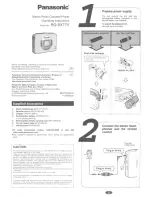
2 Operational Basics
This chapter provides an overview of the player’s internal operations — Operating
Modes and the player’s Active States; RS-232C Interface, and Function Switches.
Before developing or presenting programs on the CLD-V5000 the user should read
this chapter and become familiar with the operational basics. (See
Appendix B, C,
and
D
for details on
CLD-V5000 Interface Cable Specifications, Internal Player
Controls
and
Internal Player Registers.
2.1 Internal Operations
The player’s internal operating processes are classified into two groups:
Operating
Modes
indicating player operation status, and
Active States
indicating player
processing status.
2.1.1 Operating Modes
The CLD-V5000 has the following two
Operating Modes
:
Normal Control Mode
and
Test Mode.
(See
Figure 2-A
on next page.)
These modes are defined as follows:
1) Normal Control Mode
When the player’s power is turned on, the player enters
Normal Control
Mode
. In this mode, the player can be controlled by pressing buttons on the
front panel, by pressing buttons on the remote control unit, by sending
commands via the Pioneer barcode reader, or by sending commands from a
computer via the RS-232C connector.
2) Test Mode
The
Test Mode
is set in Register C under computer control. (See page 3-42) It
is used for player maintenance and management. This mode is used primarily
by Authorized Service Company (ASC) personnel to determine key part
numbers of the player and to service the player. Generally, the player is not
controlled in this mode.
2.1.2 Active States
CLD-V5000 processing is performed within several distinct
Active States.
When a
command is executed, the
Active State
changes inside the player. If you consider
player processing as a series of events within the
Active States
listed below
,
it is
easier to understand the effects of various commands. The player’s five main
Active
States
are:
• Door Open
• Park
• Spin Up
• Random Access
• Spin Down
CLD-V5000 Level III • Chapter Two
CLD-V5000 Level III User’s Manual
TP 121
v. 1.0 • 1/96
2-1












































